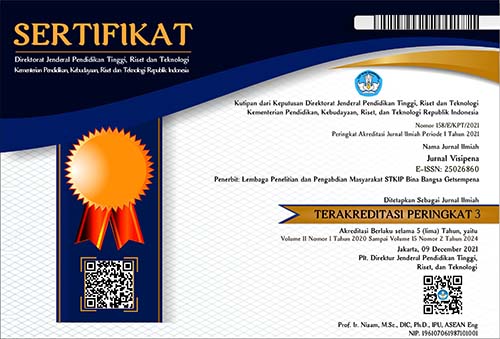STORING THE INFORMATION INTO LONG TERM MEMORY AND ITS IMPACTS ON LEARNING MATHEMATICS
Abstract
Memory obviously plays an important role in knowledge retention. In particular, when learning mathematics students claim that much of what is taught in classrooms is soon forgotten and learning mathematics is difficult or not interesting. Neuroscience, through its study on long term memory, has tried to identify why these phenomena occur. Then some possible solutions are suggested. Understanding the processes of memory storage including acquisition, consolidation, recoding, storing and retrieval helps teachers to efficiently plan for effective learning activities. Therefore, this paper outlines the potential implication of long term memory to mathematics learning as well as suggests some learning strategies that might solve students‟ and teachers‟ problem in learning mathematics.
Downloads
References
Baddeley, A. (2004). Your Memory: A user’s guide, London: Carlton Books.
Bahrick, H. P. (2000). Long Term Maintenance of Knowledge, the Oxford handbook of Memory, Eds (Endel Tulving and Fergus, M, Craik), London: Oxford University Press.
Blakemore, S-J. & Frith, U. (2006) The Learning Brain: Lessons for Education. USA, UK, Aust: Blackwell Publishing.
Cohen, G.. & Stanhope, N. (1992) „Very Long Term Memory for knowledge Acquired at School and University‟, Applied Cognitive Psychology 6: 476-482.
Engelbrech, J., Harding, A. & Preez, J, U. (2007) „Long term retention of mathematical knowledge and skills with engineering student‟, European Journal of Engineering Education 32 (6): 735-744.
Freedman, M. L., & Martin, R, C. (2001). Dissociable components of short term memory and their relation to long term learning‟, Cognitive Neuropsychology 18 (3): 193-226.
Gazzaniga, M. S, Ivry, R, B. & Mangun, G. R. (2000). Cognitive Neuroscience: The Biology of The mind, New York and London: W.W Norton & Company.
Greenfield, S. (2000) Brain Story: Unlocking our inner world of emotion, memories, ideas and desire, London: BBC.
Li, X., & Li, Y. (2003) „Research on Students‟ Misconception to Improve Teaching and Learning in School Mathematics and Science, Research in Brief 108 (1): 4-7.
OECD, (2002) Understanding the Brain toward a New learning Science, Organization For Economic Co-operation and Development, Paris.
Rohrer, D., & Pashler, D. (2007) „Increasing retention without increasing study time‟, Association for Psychology Science 16 (4):183-186.
Ruchkin, D. S., Grafmen, J., Cameron, K., & Berndt, R, S. (2003) „Working Memory Retention System; A state of Activated Long Term Memory‟, Behavioral and Brain Sciences 26:709-777.
Schwartz, B., and Reisberg, D. (1991). An Alternative Approach to memory: Level of Processing, Leaning & Memory, New York: W.W Norton and Company.
Simon, S., J. & Spiers, H. J. (2003) „Prefrontal and Medial Temporal Lobe interaction in long term memory‟, Nature Reviews: Neuroscience 4: 637-648.
Sousa, D. A. (2000). How the Brain Learns, (2nd edition), Corwin Press: Thousand Oaks: California.
Squire, L. R., & Kandel, E. R. (2000). Memory from mind to Molecules, Scientific American Library, a division of HPHLP: New York.




















